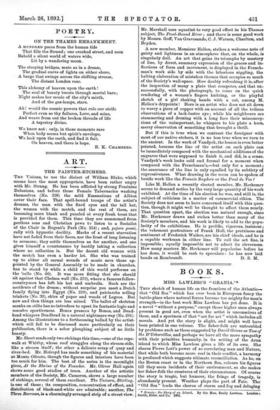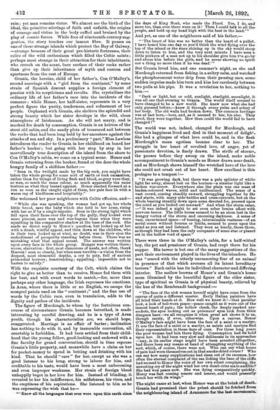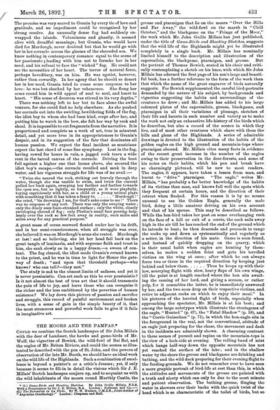BOOKS.
MISS LAWLESS'S " GRANIA."* THIS sketch of human life on the frontiers of the Atlantic—. that "Old Sea" which has ever been in European fancy the battle-place where natural forces become too mighty for man's strength—is the beet work Miss Lawless has yet done. It is a novel "without a purpose," except those higher ones always present in good art, even when the artist is unconscious of them, and a specimen of that "art for art" which includes all morals. And yet the story is slight, and might well have been printed in one volume. The fisher-folk are untroubled by problems such as those suggested by David Grieve or Tess of the D'Urbervilles, and perhaps we have all the more sympathy with their primitive humanity, in its setting of the Aran island to which Miss Lawless gives a life of its own. She shares Pierre Loti's power of so correlating man and Nature, that while both become more real in their conflict, a harmony is produced which suggests ultimate reconciliation. As he, on the Breton coast or in the Northern Sea, colours his figures till they seem incidents of their environment, so she makes her fisher-folk the creatures of their circumstance. Of course the story is tragic, but humour, the fringe of tragedy, is abundantly present. Weather plays the part of Fate. The "Old Sea" leads the chorus of storm and fog and deluging
• Grania : the Story of an Island. By the Hon. Emily Lawless. London s Smith, Elder, and Co. 1892.
rain ; yet man remains victor. We almost see the birth of the ideal, the primitive stirrings of faith and nnfaith, the origins of courage and virtue in the body cuffed and bruised by the play of cosmic forces. While free of nineteenth-century sug- gestion, the story touches our inmost fibre. It passes on one of those strange islands which protect the Bay of Galway, —strange because of their great pre-historic fortresses, their relics of the wild enthusiasm which filled the Celtic saints ; perhaps most strange in their attraction for their inhabitants, who crouch on the scant, bare surface of their rocks rather than give up their inheritance of myth and custom and apartness from the rest of Europe.
Grania, the heroine, child of her father's, Con O'Malley's, second marriage with a "girl from the continent," by some strain of Spanish descent supplies a foreign element of passion with its scepticisms and revolts. She crystallises the ordinary life of her father's race into the incidents of the romance ; while Honor, her half-sister, represents in a very perfect figure the purity, tenderness, and refinement of her people. Orphaned with Grania, she shelters the splendid and atrong beauty which her sister develops in the wild, clean atmosphere of Inishmaan. As she will not marry, and is marked for death by consumption, Grania is an heiress of the stout old cabin, and the sandy plots of treasured soil between the rocks that had been long held by her ancestors against the attacks of sea and sky. In a preliminary "part," Miss Lawless introduces the reader to Grania in her childhood on board her father's hooker ; but going with her step by step in her marvellously true description of the island from the shore to Con O'Malley's cabin, we come on a typical scene. Honor and Grania returning from the hooker, found at the door the whole hungry family of a shiftless father :—
" Seen in the twilight made by the big rock, you might have taken the whole group for some sort of earth or rock emanation, rather than for things of living flesh and blood, so grey were they, so wan, so much the same colour, so much apparently the same texture as what they leaned against. Honor started forward at a run as soon as she caught sight of them, her pale face lit with a warm ray of kindliness and hospitality."
She welcomed her poor neighbours with Celtic effusion, and- " While she was speaking, the woman had got up, her whole little brood, save the baby which she held in her arms, rising with her as if by a single impulse. Seen in the strong light which fell upon their faces over the top of the gully, they looked even more piteous, more wan and woe-begone than when they were squatting in the comparative shadow at the base of the rock. She made no direct reply to Honor's question, but looked up at her with a dumb, wistful appeal, and then down at the children, who in their turn looked up at what, no doubt, was in their eyes the embodiment of prosperity standing before them. There was no mistaking what that appeal meant. The answer was written upon every face in the whole group. Hunger was written there ; worse, starvation : first, most clamorous of needs, not often, thank Heaven ! seen so clearly, but when seen terrible —a vision from the deepest, most elemental depths, a cry to pity, full of ancient primordial horrors; heartrending ; appalling : impossible not to hasten to satisfy?'
With the exquisite courtesy of the Celt, which claims the right to give as better than to receive, Honor fed them with her beat, and with sweet words to match,—for, more than perhaps any other language, the Irish expresses the emotions.
In Aran, where there is little or no English, we escape the mongrel patois used on the "continent ;" and the fine use of words by the Celtic race, even in translation, adds to the dignity and pathos of the incidents.
The figure of Murdough, to whom by the fortuitous con- course of circumstance Grania becomes betrothed, is made interesting by careful drawing, and he is a type of Aran youth, though his characteristics are, we should hope, exaggerated. Marriage is an affair of barter ; inclination has nothing to do with it, and by inexorable convention, all courtship is forbidden. It had been settled from their child- hood that the young fellow, good-looking and endowed with a fine faculty for grand conversation, should in time espouse Grania's little property, and meanwhile have a claim on her for pocket-money to spend in betting and drinking with his kind. That he should " care " for her, except as she was a good listener to his brag, strong to labour for him, and creditable to his taste, would have been a most unbecoming and even improper weakness. Her strain of foreign blood unhappily begot in her love for him. Instead of blinding, it revealed to her his indifference, his selfishness, his vices, and the emptiness of his aspirations. She listened to him as he was expressing the wish that he-
" Knew all the languages that ever were upon this earth sinoe
the days of King Noah, who made the Flood. Yes, I do, and more too, than ever there were on it ! Then I could talk to all the- people, and hold up my head high with the best in the land."
And yet, as one of the neighbours said of his father,— " 'The heart of him was no better than the heart of a pullet.. I have heard him one day so you'd think the wind flying over the, top of the island or the stars shining up in the sky would stoop. down to listen to him, and the very next minute I have seen a little pinkeen of a man not up to his shoulder give him the go-by and abuse him before the girls, and he never showing no spirit nor a thing no more than if he was dead."
But Grania loved him, and one summer's night, as she and Murdough returned from fishing in a sultry calm, and watched' the phosphorescent water drip from their pausing oars, some. sudden impulse made him turn and kiss her carelessly between- two pulls at his pipe. It was a revelation to her, nothing to him :— "Dark or light, hot or cold, sunlight, starlight, moonlight, it was all one that evening to Grania. The world itself seemed to have changed to be a new world. She knew now what she had- only guessed before,—knew it through every pulse and artery of her body. The old walls had broken down. The common heritage was at last hers,—hers, and, as it seemed to her, his also. They loved, they were together. How then could the world fail to have changed ?"
The world was not, indeed, changed for Murdough, and Grania's happiness lived and died in that moment of delighl-.. She had a glimpse of what love could be, and in the flash Murdough's mean egotism became clear to her. The struggle in her heart of revolted love, of anger, yet of passionate devotion, is finely drawn. The strife of stormF, the pauses before they swoop on the island, make noble accompaniment to Grania's moods as Honor draws near death, and as Murdough shows himself the wretched hero of the love she could not crush out of her heart. How excellent is this prologue to a tempest !— "It was growing dark, but there was a pale splinter of white. light far away, almost lost on the horizon—a sinister light like a broken war-arrow. Everywhere else the plain was one mass of leaden-coloured waves, solid and unillumined. The sense of a. vast crowd, coming steadily onward, struggling together by fits and starts, with many side-battles and cross-currents, but on the whole bearing steadily down upon some devoted foe, pressed upon the mind as you looked out seaward." And when the storm came, —"It was indeed a night to set even sober brains afloat with nervous terror. The little house seemed to be an atom lost in the hungry vortex of the storm and oncoming darkness. A sense of vast, uncurtained space—of tossing, interminable vastness—of am aerial ocean without bourne or limits, seemed to press upon the mind as you sat and listened. They were as lonely, those three,, as though they had been the only occupants of some star or planet set in the hollow void of space."
There were three in the O'Malley's cabin, for a half-witted boy, the pet and pensioner of Grania, had crept there for Ms supper. His terror is but one of the many suggestions of the- part their environment played in the lives of the islanders. He was "scared with the utterly unreasoning fear of an animal' in presence of that which arouses all its latent hereditary terrors." Each cabin has its individual character and differing interior. The mellow browns of Honor's and Grania's home seem illumined by the beautiful figure of the elder sister, type of spiritual as Grania is of physical beauty, relieved by the hue of the Rembrandt background :—
" The face of the sick woman herself might have come from the canvas of quite a different master. Early Italian painters have all tried their hands at it. How well we know it !—that peculiar look, a look of toil-worn peace—peace caught as it were out of the inmost heart of pain; the hollow cheek, the deeply marked eye- sockets, the eyes looking out as prisoners' eyes look from thein dungeon bars—we all recognise it when great art shows it to us, though rarely, if ever, otherwise. Upon a canvas, Honor O'Malley's face might have been the face of a saint or a martyr. It was the face of a saint or a martyr, as saints and martyrs find. their representation in these days of ours. For three long years the poor woman had lain there dying. Consumption had its hold upon her. It had been very Blow and deliberate in its approaches —nay, in its earlier stage might have been arrested altogether, had there been any means at hand of attempting anything of the sort, which, of course, there were not. Who can say what hours of pain had worn themselves out in that smoke-dried corner ? Who can say how many supplications had risen out of its recesses, how- of ten the eternal complaint of the sea licking the base of the cliffs had seemed to Honor the voice of her own silent complaining, the unresting cry of the night wind her own dumb cries made audible? She had won peace now. She was dying comparatively quickly. Mercy was fast coming nearer and nearer, and would presently touch her with its wings."
The night came at last, when Honor was at the brink a death. Grania had promised that the priest should be fetched from the neighbouring island of A.ranmore for the last sacraments.
The promise was very sacred to Urania by every tie of love and gratitude, and no impediment could be recognised by her `iitrong resolve. An unusually dense fog had suddenly en- wrapped the islands. Voluminous and ghastly, it seemed alive with dreadful meanings ; but Urania, who would have died for Murdough, never doubted but that he would go with her in her corracle across the glooms of the shrouded sea. We know nothing in contemporary romance equal to the scene of her passionate pleading with him not to forsake her in her need, and his refusal to face the "wicked" fog. He could not see the necessities of her heart. The terror of natural force, perhaps hereditary, was on him. He was egotist, however, rather than cowardly. In her agony that he should so desert her in her need, Urania tried to rouse some response to her
love : he was but shocked by her vehemence. She flung her arms round him in wild appeal of soul to soul, and heart to heart. "His sense of decorum was stirred to its very depths." There was nothing left to her but to face alone the awful
venture, for she could find no help elsewhere. As she pushed her corracle out into the swirling, bewildering folds of the fog, the idiot boy to whom she had been kind, crept after her, and putting him to watch in the bow, she felt her way by rock and shoaL It is impossible to out fragments from the narrative. It is proportioned and complete as a work of art, true in minutest detail, and yet more true in its appropriateness to Grania's despair, and in its suggestion of the fate that dominates all human passion. We expect the final incident as musicians expect the last chord of some fine symphony. Lost in the fog, having rowed for hours in vain, a jagged rock tears a wide rent in the tarred canvas of the corracle. Driving the boat full against a higher one that looms above, she secured the idiot boy's escape,—the corracle recoiled and sank in deep water, and her vigorous struggle for life was of no avail :—
"Twice she neared the rock, striking out bravely through the water, though she was unable to swim, and twice the current pulled her back again, sweeping her farther and farther towards the open sea, but so lightly, so buoyantly, as it were playfully, toying capriciously with her, as a child or a young animal plays
with something that it has taken a fancy to Murdough ! ' she cried, "tis drowning I am, for God's sake come to ma!' There was no response of any sort. There was only the swaying water ; only the dimly seen foam-streaked surface ; only the white, closely enveloping shroud of fog ; only Phelim's small face peering help- lessly over the rock so few feet away in reality, such miles and miles away for any practical purpose."
A great mass of ocean seaweed floated under her in its drift, and in her semi-consciousness, when all struggle was over,
she believed it was on Murdough's arms she rested. Murdough at last ! and so believing, she let her head fall back on the great tangle of laminaria, and with supreme faith and trust in him, she sank slowly as in a happy dream,—a swoon of con- tent. The fog cleared, the idiot made Grania's errand known to the priest, and he was in time to light for Honor the gate- way of death ; "and upon that threshold perhaps—who knows? who can tell P—they met."
The study is sad to the utmost limits of sadness, and yet it is never pessimistic. Can art such as this be ever pessimistic ? Is it not almost the test of true art that it should transmute the pain of life to joy, and leave those who can recognise it
the richer and the less embittered by the poverties of human existence P We lay down this picture of passion and sacrifice and struggle, this record of painful environment and broken lives, with a sense of gain in the simple beauty of it, that the most strenuous and powerful work fails to give if it fails in imaginative art.




































 Previous page
Previous page